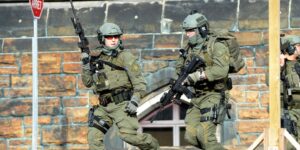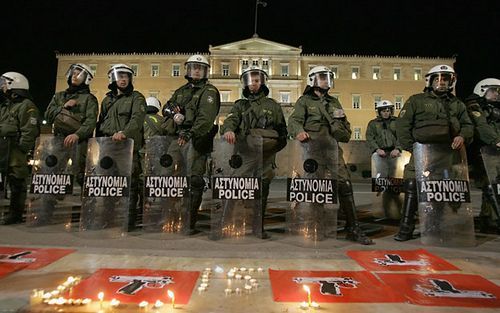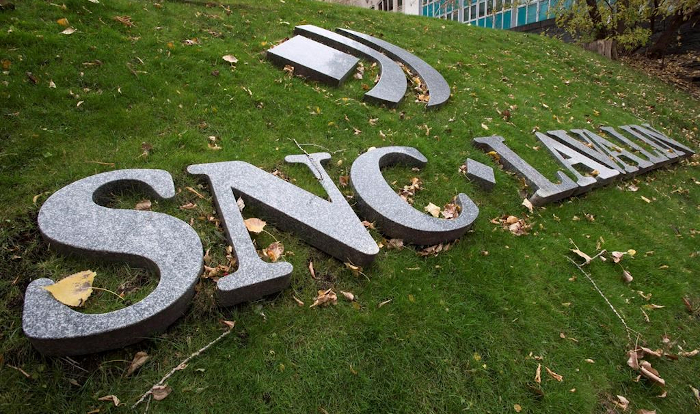
Tory government whips-up terrorist fears to boost Canada’s imperialist role.
The media in Canada, and internationally, has been filled with reports of, and commentary on,the attack on the Canadian Parliament, in Ottawa, Canada’s capital.
On October 22 a lone gunman shot and killed Corporal Nathan Cirillo, a soldier on honour guard at the National War Memorial, and then entered the Parliament building firing shots, until he was killed. Much of the centre of Ottawa and Parliament Hill was locked down for several hours after the incident.
The events in Ottawa came only 2 days after a driver deliberately ran over 2 soldiers in a town south of Montreal, killing Warrant Officer Patrice Vincent. The car driver, Martin Couture-Rouleau, was later killed by the police.
Of course people across Canada were shocked and saddened by these events. They also gave rise to a huge amount of talk by politicians and the media about terrorist attacks and threats – linked to reactionary Islam.
From all the reports, it seems that both acted alone. Couture-Rouleau had converted to Islam in the last 2 years after what has been described as a ‘dark period in his life’ following his small business hitting problems. More recently he had started putting pro-ISIS material on his Facebook.
The Ottawa gunman Michael Zehaf-Bibeau however does not fit the same pattern. He had a history of mental illness and drug problems, been homeless and, when charged with robbery in 2011, told the judge that as he was homeless and a drug addict he wanted to go to jail to sort himself out.
Zehaf-Bibeau had spent some time at a mosque, but had been told to leave due to his behaviour. He had also stayed in a Salvation Army shelter in Vancouver, where again his behaviour annoyed people. He clearly needed help and support, but never received any.
There has been a third targeted killing of authority figures in Canada this year. In June in New Brunswick another young man, Justin Bourque, shot and killed three police officers and wounded two others, before being arrested. The prosecutor in his case said that he targeted the Royal Canadian Mounted Police “specifically because of who they were, what they did, the badge they carried”. However, Justin Bourque’s actions have not been described as terrorist – they are called a crime.
Why the difference? Bourque had mental health issues, friends had been alarmed by his aggressive behaviour and he was described as paranoid by his father. He also posted political comments on his Facebook. However, Bourque posted right-wing, extreme populist comments rather Couture-Rouleau’s reactionary ideas wrapped in an Islamic flag. Bourque complained about the lack of freedom of speech and the “rule of tyrants” and had shared slogans such as “Free Men Do Not Ask Permission to Bear Arms” and “Militia Is Only a Bad Word if You’re a Tyrant”
How many of these killers are called terrorists? The Conservative government clearly thinks only two of them were. Only Couture-Rouleau expressed support for ISIS. Zehaf-Bibeau seems to have had some links to Islam and been flirting with more violent ideas, but he had a long history of drug abuse and mental illness and had made several pleas for help over the years. But the government wants to hype up the threat of terrorism.
Even before the attack in Ottawa, the Conservatives planned to give more powers to Canada’s spy agency, Canadian Security Intelligence Service (CSIS). Within days of the shooting in the Parliament Building, the Public Safety minister Blaney moving changes to the law stated that it is “time that we stop under-reacting to the great threats against us”.
The proposed legislation Bill C-44, among other things, would allow complete confidentiality to CSIS sources, so avoiding any cross-examination in court; and allow CSIS to investigative activities outside Canada “without regard to any other law, including that of any foreign state”. The government has not announced any plans to increase Parliament’s oversight of CSIS. The government said it is considering further changes to the law.
All three killers were young men, ages 32, 25 and 24, whose lives had not gone well. They were all alienated from society and had some mental health problems. Only one, Couture-Rouleau, was considered by the police and spy agency to be a threat and he had been contacted by them. Michael Zehaf-Bibeau had been to prison but was not considered a security threat. Justin Bourque did not appear to be on anyone’s radar.
All were depressed, and emotionally and financially unstable. One expert, David Welch, pointed out that, “the problem is not Muslim radicalization so much as maladjusted males”.
The Conservatives will, no doubt, use the killings of the two soldiers to step up ‘security’, increase military spending, push harder on ‘the war on terrorism’ abroad, spend more money on spies and prisons, and reduce democratic rights.
Will any of these stop similar acts in the future, of a single, mentally unstable, alienated young man with a weapon?
More effective would be to provide proper support for mentally ill people, to repair Canada’s tattered social safety net and ensure there are good jobs.
But that would run counter to the entire program of the Tories – they want to boost Canada’s imperialist role and a slightly paranoid population helps that. In addition, acting against ‘terrorism’, may help Harper present himself as strong leader and distract from all his difficulties at home. Perhaps Harper is lining up his election strategy of re-elect him, for stability in an unstable world.



